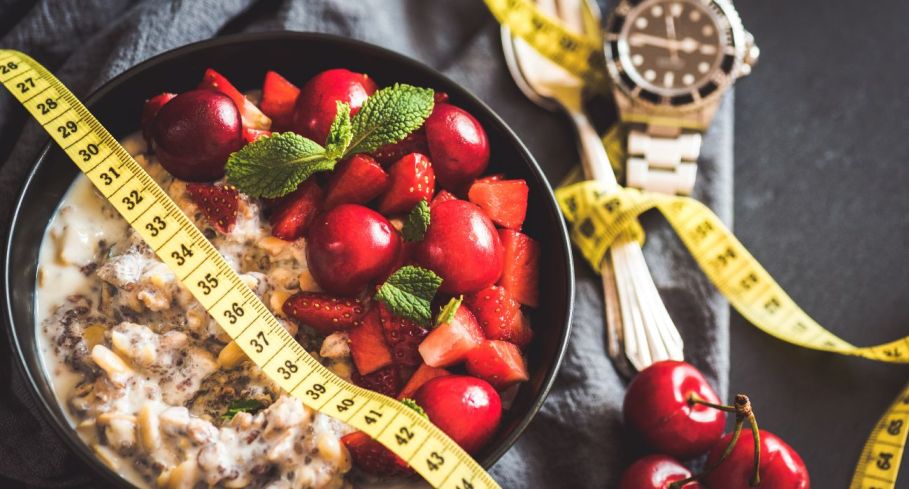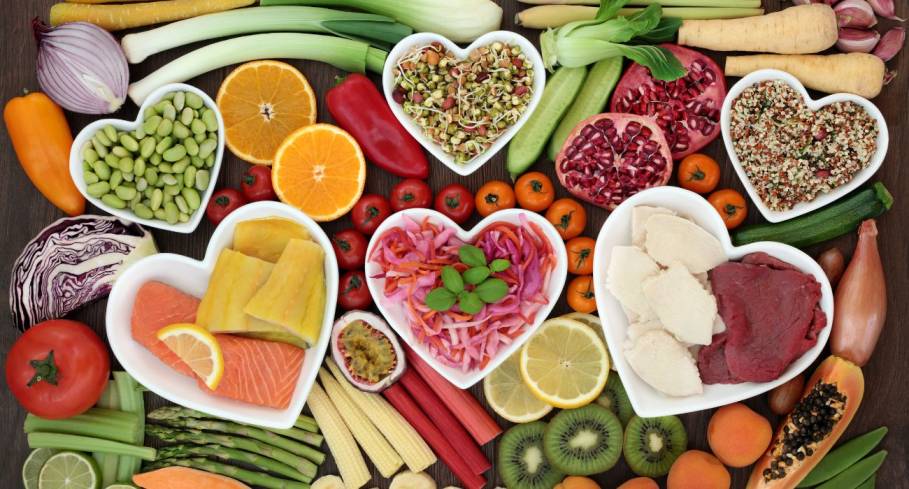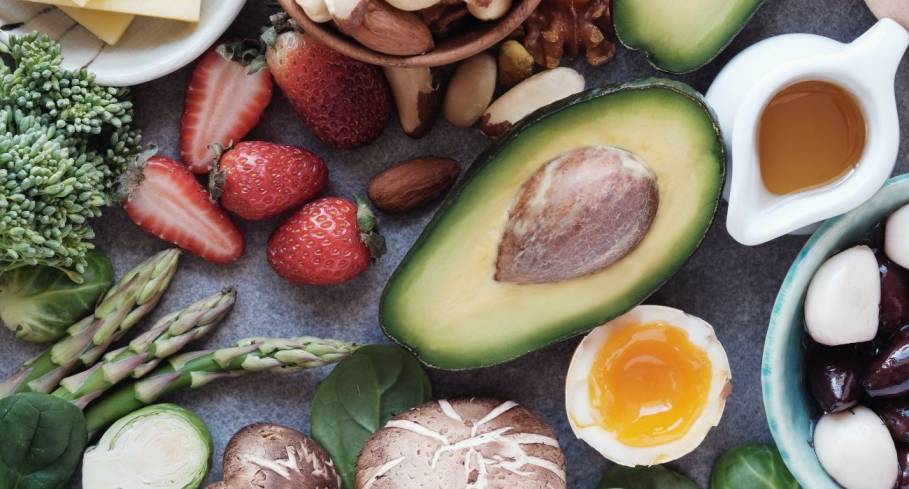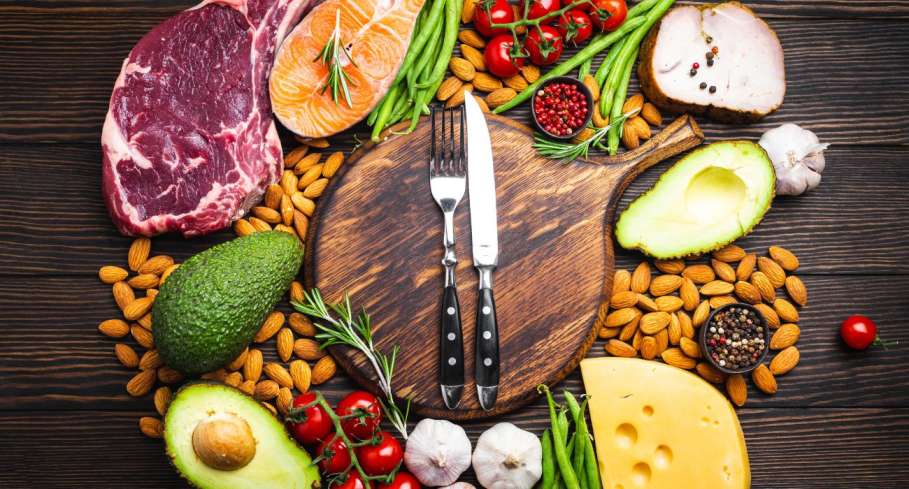
In today’s world, where obesity has become a major health concern, people are continuously looking for ways to lose weight. From crash diets to intense workout regimes, there is no dearth of options to shed those extra pounds. However, it is important to understand that weight loss is not just about cutting down on calories; it is also about making the right choices when it comes to food. In this article, we will discuss some of the best foods that can help you lose weight effectively.
- Leafy Greens
Leafy greens are one of the most nutrient-dense foods on the planet. They are low in calories and high in fiber, making them an excellent choice for weight loss. Some examples of leafy greens include spinach, kale, lettuce, and collard greens. These greens are also rich in vitamins and minerals, making them a great addition to any healthy diet. Foods That Help in Weight Loss.
- Whole Eggs
Whole eggs are another food that can help in weight loss. Eggs are high in protein, which can help you feel full for longer periods of time, thus reducing your overall calorie intake. In addition, eggs are also rich in vitamins and minerals that are essential for overall health. However, it is important to note that eggs should be consumed in moderation, as they are also high in cholesterol.
- Lean Meat
Lean meats, such as chicken breast and turkey, are another great source of protein. Protein is important for weight loss as it helps to build and repair muscle tissue, which in turn helps to boost metabolism. In addition, lean meats are low in calories and fat, making them an excellent choice for those looking to lose weight.
- Beans and Legumes
Beans and legumes are high in protein and fiber, making them an excellent choice for weight loss. They are also low in calories and fat, making them a great alternative to meat for those who follow a vegetarian or vegan diet. Some examples of beans and legumes include chickpeas, black beans, lentils, and kidney beans.
- Nuts
Nuts are a great source of healthy fats, protein, and fiber. They are also rich in vitamins and minerals, making them an excellent choice for weight loss. However, it is important to note that nuts are also high in calories, so they should be consumed in moderation. Foods That Help in Weight Loss.
- Fruits
Fruits are an excellent source of vitamins, minerals, and fiber. They are also low in calories and fat, making them a great addition to any healthy diet. Some examples of fruits that are great for weight loss include berries, apples, pears, and oranges.
- Whole Grains
Whole grains, such as brown rice, quinoa, and oats, are an excellent source of fiber and protein. They are also low in calories and fat, making them an excellent choice for weight loss. In addition, whole grains are also rich in vitamins and minerals, making them an important part of any healthy diet.
- Yogurt
Yogurt is an excellent source of protein and calcium, making it an excellent choice for weight loss. It is also low in calories and fat, making it a great snack option for those looking to lose weight. However, it is important to choose plain yogurt without added sugars or flavors.
- Green Tea
Green tea is rich in antioxidants and can help to boost metabolism, making it an excellent choice for weight loss. In addition, green tea is also a natural diuretic, which can help to reduce bloating.
- Water
Water is essential for overall health and can also help with weight loss. Drinking water can help to reduce hunger, thus reducing overall calorie intake. It can also help to flush out toxins from the body, improving overall health.
- Avocado
Avocado is a great source of healthy fats, fiber, and vitamins. It can help to reduce hunger and cravings, thus reducing overall calorie intake. In addition, avocado can also help to improve heart health and lower cholesterol levels.
- Salmon
Salmon is an excellent source of protein and healthy fats, making it an excellent choice for weight loss. It is also rich in omega-3 fatty acids, which can help to reduce inflammation and improve overall health.
- Chia Seeds
Chia seeds are an excellent source of fiber and protein, making them an excellent choice for weight loss. They can help to reduce hunger and cravings, thus reducing overall calorie intake. In addition, chia seeds are also rich in omega-3 fatty acids, which can help to improve heart health.
- Sweet Potatoes
Sweet potatoes are an excellent source of fiber, vitamins, and minerals. They are also low in calories and fat, making them an excellent choice for weight loss. Sweet potatoes can also help to regulate blood sugar levels, making them an important part of any healthy diet.
- Cinnamon
Cinnamon is a great spice that can help to regulate blood sugar levels and improve insulin sensitivity, making it an excellent choice for weight loss. In addition, cinnamon can also help to reduce inflammation and improve overall health.
- Berries
Berries, such as blueberries, strawberries, and raspberries, are an excellent source of fiber and antioxidants. They are also low in calories and fat, making them an excellent choice for weight loss. Berries can also help to improve heart health and lower cholesterol levels.
- Grapefruit
Grapefruit is a great fruit that can help to regulate blood sugar levels and improve insulin sensitivity. It is also low in calories and fat, making it an excellent choice for weight loss. Grapefruit can also help to reduce inflammation and improve overall health.
- Apple Cider Vinegar
Apple cider vinegar is a great vinegar that can help to regulate blood sugar levels and improve insulin sensitivity. It can also help to reduce hunger and cravings, thus reducing overall calorie intake. In addition, apple cider vinegar can also help to improve digestion and gut health.
- Broccoli
Broccoli is an excellent source of fiber, vitamins, and minerals. It is also low in calories and fat, making it an excellent choice for weight loss. Broccoli can also help to reduce inflammation and improve overall health.
- Dark Chocolate
Dark chocolate is a great source of antioxidants and can help to reduce inflammation and improve overall health. It can also help to reduce hunger and cravings, thus reducing overall calorie intake. However, it is important to choose dark chocolate with a high percentage of cocoa and consume it in moderation.
Top 10 Foods that Can Help You Lose Weight

Maintaining a healthy weight is essential for good health, and losing weight is a common goal for many people. While exercise is an important component of weight loss, what you eat also plays a crucial role. Incorporating the right foods into your diet can help you lose weight and keep it off. In this article, we will discuss the top 10 foods that can help you achieve your weight loss goals.
- Leafy Greens
Leafy greens, such as kale, spinach, and collard greens, are packed with nutrients and are very low in calories. They are high in fiber, which can help you feel full and satisfied for longer periods, making you eat less overall. Leafy greens are also high in vitamins and minerals, such as calcium, which can help maintain bone health. They can be easily added to salads, soups, or smoothies, making them a great addition to any meal.
- Whole Grains
Whole grains, such as brown rice, quinoa, and oats, are also a great food to help with weight loss. They are high in fiber and protein, which can help keep you feeling full for longer. They also have a lower glycemic index than refined grains, which means they do not cause a sudden spike in blood sugar levels. This makes them a great option for people who are trying to manage their blood sugar levels or have type 2 diabetes.
- Lean Proteins
Lean proteins, such as chicken, turkey, fish, and tofu, are important for building and repairing muscles. They are also high in protein, which can help keep you feeling full and satisfied for longer. Protein is also important for weight loss because it requires more energy to digest, meaning you burn more calories when you eat protein. Adding lean proteins to your meals can help you feel fuller for longer and help you reach your weight loss goals.
- Nuts and Seeds
Nuts and seeds are high in healthy fats, fiber, and protein, making them a great addition to
any weight loss diet. They are also high in antioxidants, which can help reduce inflammation and protect against chronic diseases. Nuts and seeds can be added to salads, oatmeal, or eaten as a snack. However, it is important to watch portion sizes, as they are also high in calories.
- Avocado
Avocado is a unique fruit that is high in healthy fats, fiber, and vitamins. It is also low in carbohydrates, making it a great option for people who are trying to follow a low-carb diet. Avocado can be added to salads, sandwiches, or eaten on its own. It can also be used as a replacement for mayonnaise or sour cream in recipes.
- Berries
Berries, such as strawberries, blueberries, and raspberries, are high in antioxidants, fiber, and vitamins. They are also low in calories and sugar, making them a great option for people who are trying to lose weight. Berries can be eaten as a snack, added to smoothies, or used as a topping for oatmeal or yogurt.
- Legumes
Legumes, such as beans, lentils, and chickpeas, are high in fiber, protein, and vitamins. They are also low in fat and calories, making them a great option for people who are trying to lose weight. Legumes can be added to soups, stews, or salads, making them a great addition to any meal.
- Cruciferous Vegetables
Cruciferous vegetables, such as broccoli, cauliflower, and Brussels sprouts, are high in fiber, vitamins, and minerals. They are also low in calories, making them a great option for people who are trying to lose weight. These vegetables also contain compounds that have been shown to have anti-cancer properties. They can be roasted, steamed, or added to stir-fries for a delicious and healthy meal.
- Greek Yogurt
Greek yogurt is high in protein and low in sugar, making it a great option for people who are trying to lose weight. It is also a good source of calcium, which is important for maintaining bone health. Greek yogurt can be used as a replacement for sour cream or mayonnaise in recipes, or eaten as a snack with berries and nuts.
- Water
While not a food, water is an essential part of any weight loss diet. Drinking water can help you feel full and satisfied, making you eat less overall. It can also help boost your metabolism, helping you burn more calories. Drinking water before meals can also help you eat less, as it can help fill you up before you start eating.
In addition to incorporating these foods into your diet, it is important to also focus on portion control and mindful eating. Eating slowly and being aware of your hunger and fullness cues can help you avoid overeating and reach your weight loss goals. Foods That Help in Weight Loss.
It is also important to note that no single food or food group can magically make you lose weight. Weight loss is a complex process that involves a combination of factors, including diet, exercise, sleep, and stress management. Incorporating the right foods into your diet can certainly help, but it is just one piece of the puzzle.
Incorporating the right foods into your diet can help you lose weight and improve your overall health. Leafy greens, whole grains, lean proteins, nuts and seeds, avocado, berries, legumes, calciferous vegetables, Greek yogurt, and water are all great options for people who are trying to lose weight. However, it is important to focus on portion control and mindful eating, as well as other lifestyle factors, such as exercise, sleep, and stress management. By making small changes to your diet and lifestyle, you can achieve your weight loss goals and maintain a healthy weight for years to come.
Foods That Help in Weight Gain: A Comprehensive Guide

When we think about weight management, most of us tend to focus on losing weight. However, for some people, gaining weight can be just as difficult as losing it. Whether it’s due to a high metabolism, a busy lifestyle, or a medical condition, gaining weight can be a challenge for many individuals. Fortunately, there are many foods that can help you put on weight in a healthy way. In this article, we will discuss the best foods that help in weight gain, their nutritional value, and how to incorporate them into your diet.
Nuts and Seeds:
- Nuts and seeds are a great source of healthy fats, protein, and calories, making them an excellent choice for those looking to gain weight. They also contain fiber, which can help keep you feeling full and satisfied. Some of the best nuts and seeds for weight gain include almonds, walnuts, pecans, cashews, chia seeds, and flaxseeds. You can add these to your smoothies, yogurt, or oatmeal, or snack on them throughout the day. Foods That Help in Weight Loss.
Whole Grains:
- Whole grains are another excellent source of healthy carbohydrates, fiber, and nutrients. They are also calorie-dense, meaning you can consume more calories per serving than with refined grains. Some examples of whole grains include quinoa, brown rice, oats, bulgur, and barley. You can incorporate these into your meals by swapping out refined grains for whole grains, such as using brown rice instead of white rice or whole-wheat bread instead of white bread. Foods That Help in Weight Loss.
Dairy Products:
- Dairy products are a great source of protein, calcium, and other important nutrients. They are also calorie-dense, making them an excellent choice for those looking to gain weight. Some of the best dairy products for weight gain include whole milk, cheese, yogurt, and cottage cheese. You can use these as a base for smoothies or add them to your meals as a source of protein.
Fruits:
- Fruits are an essential part of a healthy diet, and they can also be an excellent choice for those looking to gain weight. Some of the best fruits for weight gain include bananas, avocados, mangos, and dried fruits such as dates and raisins. These fruits are high in calories and healthy fats, making them a great choice for adding to smoothies or as a snack.
Lean Proteins:
- Protein is an essential nutrient that plays a vital role in muscle building and repair. Consuming lean proteins can help you gain muscle mass, which can contribute to weight gain. Some of the best sources of lean proteins include chicken breast, turkey breast, fish, lean beef, and tofu. You can incorporate these into your meals by grilling, baking, or roasting them.
Healthy Fats:
- Consuming healthy fats can help you gain weight while also providing essential nutrients and energy. Some of the best sources of healthy fats include avocado, olive oil, coconut oil, nuts, and seeds. You can use these in your cooking, as a salad dressing, or as a topping for your meals.
Protein Bars and Shakes:
- Protein bars and shakes are an easy and convenient way to increase your protein intake and gain weight. They are also a great option for those with busy lifestyles who may not have time to prepare meals. When choosing a protein bar or shake, look for products that are low in sugar and contain high-quality protein sources such as whey or soy.
Nutrient-Dense Foods:
- Nutrient-dense foods are foods that are high in nutrients and calories, making them an excellent choice for those looking to gain weight. Some examples of nutrient-dense foods include sweet potatoes, beans and legumes, dark leafy greens, and lean meats. These foods are rich in vitamins, minerals, and fiber, which can help support overall health while also contributing to weight gain.
Energy-Dense Foods:
- Energy-dense foods are foods that provide a high number of calories per serving. While these foods should be consumed in moderation, they can be a useful addition to your diet when trying to gain weight. Some examples of energy-dense foods include chocolate, granola, dried fruit, and nut butters. It’s important to note that while these foods can help you gain weight, they should be consumed in moderation as they can also contribute to weight gain if consumed in excess.
Hydration:
- While not a food, hydration is essential for overall health and can also contribute to weight gain. When you are dehydrated, your body may hold onto water weight, which can make you appear thinner. By drinking enough water, you can help flush out excess sodium and water weight, which can help you gain weight in a healthy way. Aim to drink at least 8 glasses of water per day, and consider incorporating other hydrating beverages such as coconut water or herbal tea into your diet.
Incorporating these Foods into Your Diet:
When incorporating these foods into your diet, it’s important to do so in a balanced way. Focus on consuming a variety of foods from each food group to ensure that you are getting all the nutrients you need. Aim to consume three meals per day and two to three snacks per day to ensure that you are consuming enough calories to gain weight. Additionally, consider increasing your portion sizes or adding healthy fats to your meals to increase their calorie content. Foods That Help in Weight Loss.
Some tips for incorporating these foods into your diet include:
- Add nuts and seeds to your smoothies, yogurt, or oatmeal
- Swap out refined grains for whole grains
- Use dairy products as a source of protein
- Incorporate high-calorie fruits into your diet as a snack or in smoothies
- Choose lean proteins for muscle building
- Use healthy fats in your cooking or as a topping for your meals
- Choose protein bars and shakes that are low in sugar and high in protein
- Include nutrient-dense and energy-dense foods in moderation
- Drink enough water and other hydrating beverages throughout the day
Gaining weight can be a challenge, but with the right foods and lifestyle changes, it’s possible to do so in a healthy way. By incorporating these foods into your diet and making other healthy lifestyle changes such as getting enough sleep and exercise, you can achieve your weight gain goals while also supporting overall health and well-being. Remember to focus on balance and moderation, and consult with a healthcare professional if you have any concerns about your weight or overall health.
Does Eating Fruits Help in Weight Loss?

Losing weight is one of the most common health goals for people across the world. Many people struggle with weight management due to various reasons such as poor diet, lack of physical activity, and genetics. However, a healthy and balanced diet is crucial for effective weight loss. Fruits are often recommended as a part of a healthy diet, but do they help in weight loss? This article aims to explore the relationship between fruits and weight loss.
Fruits are packed with vitamins, minerals, and fiber that are essential for good health. They are also low in calories, making them an ideal choice for those looking to lose weight.
However, the question is whether eating fruits alone can lead to weight loss or if they need to be combined with other healthy habits to be effective.
One of the main reasons why fruits are recommended for weight loss is because they are low in calories. Most fruits contain around 60-100 calories per serving, which is significantly lower than other snack options such as chips or cookies. Eating fruits instead of high-calorie snacks can help reduce overall calorie intake and create a calorie deficit, which is necessary for weight loss.
In addition to being low in calories, fruits are also high in fiber. Fiber is essential for weight loss as it helps keep you full and satisfied for longer periods, reducing the urge to snack or overeat. Fiber also helps regulate blood sugar levels and prevent insulin spikes, which can lead to fat storage in the body.
Another benefit of eating fruits for weight loss is that they are rich in antioxidants. Antioxidants help protect the body from damage caused by free radicals, which are produced during metabolism and exposure to environmental toxins. Free radicals can cause inflammation, which has been linked to weight gain and obesity. By consuming fruits, which are rich in antioxidants, you can help reduce inflammation in the body and promote weight loss.
Moreover, fruits are also a good source of water. Most fruits contain over 80% water, which helps keep you hydrated and promotes a feeling of fullness. When you are dehydrated, your body may mistake thirst for hunger, leading to unnecessary snacking and overeating. By eating fruits, you can help prevent dehydration and reduce the chances of overeating.
It is important to note that while fruits can help with weight loss, they should not be the only component of your diet. A balanced diet should include a variety of foods from different food groups, including whole grains, lean protein, and healthy fats. Eating a balanced diet can help ensure that your body receives all the essential nutrients it needs for good health.
Another important factor to consider is portion control. While fruits are low in calories, consuming too much of them can lead to weight gain. Fruits contain natural sugars, which can add up quickly if consumed in excess. Therefore, it is important to eat fruits in moderation and to be mindful of portion sizes.
In addition to incorporating fruits into your diet, it is also important to engage in regular physical activity. Exercise helps burn calories and increase muscle mass, which can help speed up the weight loss process. It is recommended to engage in at least 30 minutes of moderate-intensity exercise most days of the week for optimal weight loss.
Fruits can be a beneficial addition to a weight loss diet. They are low in calories, high in fiber and antioxidants, and can help keep you hydrated and full. However, they should not be the only component of your diet and should be combined with other healthy habits such as portion control and regular exercise. By adopting a balanced diet and lifestyle, you can achieve sustainable weight loss and improve your overall health and well-being. Foods That Help in Weight Loss.
Does Spicy Food Help in Weight Loss?

Obesity has become a major health concern worldwide, leading to an increase in various chronic diseases like type 2 diabetes, cardiovascular disease, and certain types of cancer. The traditional methods of losing weight such as dieting and exercising are effective, but many people find it difficult to adhere to them in the long term. Therefore, people often look for alternatives that can aid in their weight loss journey. One such alternative is spicy food. There is a belief that consuming spicy food can help in losing weight. But is it true? In this article, we will delve deeper into the subject and try to find out the spicy truth.
What is Spicy Food?
Spicy food is any dish that has ingredients that contain capsaicinoids, which are the compounds responsible for the spicy flavor. These ingredients can range from chili peppers, cumin, paprika, and mustard seeds, to name a few. Capsaicinoids stimulate the receptors in the mouth and can create a burning sensation. Capsaicinoids are also known for their medicinal properties and are commonly used in topical creams to relieve pain.
The Link Between Spicy Food and Weight Loss
Spicy food has been found to increase metabolism, leading to increased calorie burning. This effect is attributed to the presence of capsaicinoids, which can raise body temperature and enhance the metabolic rate. In one study, researchers found that the ingestion of capsaicinoids increased energy expenditure by up to 50 calories per day. Another study found that consuming spicy food before a meal can lead to reduced calorie intake.
Spicy food has also been found to reduce appetite. Capsaicinoids can trigger the release of hormones that can reduce hunger and increase satiety. One study found that consuming capsaicinoids reduced the intake of fat by 10% and the overall calorie intake by 16%.
Furthermore, spicy food can also promote fat oxidation, leading to increased fat loss. Capsaicinoids have been found to stimulate the activity of enzymes that break down fat, thereby promoting fat oxidation. One study found that consuming capsaicinoids increased fat oxidation by up to 16%.
In addition to the metabolic and appetite-suppressing effects of capsaicinoids, spicy food can also increase insulin sensitivity. Insulin sensitivity is the ability of cells to respond to insulin, leading to better glucose uptake and reduced insulin resistance. Insulin resistance is a risk factor for obesity and type 2 diabetes. By improving insulin sensitivity, spicy food can aid in weight loss and reduce the risk of chronic diseases.
Are There Any Risks to Consuming Spicy Food?
While consuming spicy food in moderation is safe for most people, some people may experience digestive problems such as heartburn, acid reflux, and stomach pain. Spicy food can irritate the lining of the stomach and esophagus, leading to these symptoms. People with gastroesophageal reflux disease (GERD) or other digestive disorders should avoid consuming spicy food.
Furthermore, some people may be allergic to certain ingredients present in spicy food. Allergic reactions can range from mild symptoms like hives and itching to severe reactions like anaphylaxis. People with a history of allergies should be cautious while consuming spicy food and seek medical attention if they experience any symptoms. Foods That Help in Weight Loss.
Spicy food has been found to have several benefits when it comes to weight loss. The capsaicinoids present in spicy food can increase metabolism, reduce appetite, promote fat oxidation, and improve insulin sensitivity. These effects can aid in weight loss and reduce the risk of chronic diseases. However, consuming spicy food in moderation is essential, as some people may experience digestive problems or allergic reactions.
How the Keto Diet Can Help You Achieve Your Weight Loss Goals

In recent years, the keto diet has become increasingly popular among those seeking to lose weight. This low-carb, high-fat diet has been shown to be effective at promoting weight loss, but many people are still unsure about how it works and whether it’s right for them. In this article, we’ll explore the science behind the keto diet and explain how it can help you achieve your weight loss goals.
What is the Keto Diet?
The keto diet is a high-fat, low-carbohydrate diet that was originally developed in the 1920s as a treatment for epilepsy. It works by forcing the body to enter a state of ketosis, in which it burns fat for fuel instead of carbohydrates.
Normally, the body uses glucose (a type of sugar) as its primary source of energy. But when carbohydrate intake is limited, as it is in the keto diet, the body starts to break down stored fat into molecules called ketones, which can be used for fuel instead. This process is called ketosis.
To achieve ketosis, followers of the keto diet typically limit their carbohydrate intake to less than 50 grams per day, and sometimes as little as 20 grams per day. They also eat moderate amounts of protein and high amounts of fat, often getting 70-80% of their daily calories from fat.
How Does the Keto Diet Help with Weight Loss?
One of the main ways the keto diet helps with weight loss is by reducing appetite. When you eat a lot of carbohydrates, your blood sugar levels rise and fall rapidly, which can lead to cravings and overeating. But when you’re in keto sis, your blood sugar levels are more stable, and you may find that you feel less hungry and are able to stick to your calorie goals more easily.
In addition, the keto diet has been shown to increase the body’s production of hormones that promote feelings of fullness, such as cholecystitis (CCK) and glucagon-like peptide-1 (GLP-1). This means you may feel more satisfied after meals and be less likely to snack or overeat. Foods That Help in Weight Loss.
Another way the keto diet promotes weight loss is by increasing the body’s ability to burn fat for fuel. When you’re in ketosis, your body is constantly breaking down stored fat into ketones to use for energy. This means you may burn more fat overall than you would on a high-carbohydrate diet.
Finally, the keto diet has been shown to be effective at reducing abdominal fat, which is the most dangerous type of fat and is associated with a higher risk of heart disease, diabetes, and other health problems. This may be because the keto diet reduces insulin levels, which can lead to a decrease in fat storage in the abdominal area. Foods That Help in Weight Loss.
Tips for Following the Keto Diet for Weight Loss
If you’re interested in trying the keto diet for weight loss, here are some tips to help you get started:
- Calculate your macronutrient ratios. To enter ketosis, you’ll need to consume high amounts of fat, moderate amounts of protein, and very low amounts of carbohydrates. A typical keto diet might consist of 70-80% fat, 20-25% protein, and 5-10% carbohydrates. Use a keto calculator to determine the right ratios for you based on your age, weight, height, and activity level.
- Plan your meals in advance. Following the keto diet requires a lot of planning and preparation, as many foods that are high in carbohydrates are off-limits. Plan out your meals for the week in advance, and make sure you have plenty of keto-friendly snacks on hand.
- Focus on healthy fats. While the keto diet allows for a lot of fat, it’s important to choose healthy sources of fat. Avoid processed foods and focus on foods like avocados, nuts and seeds, olive oil, and fatty fish.
- Get enough fiber. Since the keto diet is low in carbohydrates, it can also be low in fiber, which is important for digestive health. Make sure you’re getting enough fiber from non-starchy vegetables, such as broccoli, cauliflower, and leafy greens.
- Stay hydrated. The keto diet can cause dehydration, so it’s important to drink plenty of water throughout the day. Aim for at least 8 glasses of water per day, and consider adding electrolytes to your water to help replenish minerals lost during ketosis.
- Be patient. It can take several weeks for your body to fully adjust to the keto diet and enter ketosis. Be patient and stick with it, even if you don’t see immediate results. Remember that everyone’s body is different, and weight loss may not happen at the same rate for everyone.
Potential Risks and Considerations
While the keto diet can be effective for weight loss, it’s important to be aware of potential risks and considerations. For example, the keto diet can be difficult to maintain long-term, as it can be restrictive and limit food choices.
Additionally, the keto diet can cause side effects such as headaches, fatigue, and constipation, especially during the initial phase of ketosis. It can also lead to nutrient deficiencies if not done properly, as it limits many foods that are high in vitamins and minerals, such as fruits, whole grains, and some vegetables. Foods That Help in Weight Loss.
Finally, the keto diet may not be appropriate for everyone. People with certain medical conditions, such as kidney disease or pancreatitis, should avoid the keto diet, as it can put additional strain on the kidneys and pancreas.
Overall, the keto diet can be an effective way to achieve weight loss goals. By limiting carbohydrates and increasing fat intake, the body enters a state of ketosis and burns stored fat for fuel. This can lead to reduced appetite, increased fat burning, and a decrease in abdominal fat.
However, it’s important to be aware of potential risks and considerations before starting the keto diet. Be sure to talk to your healthcare provider before starting any new diet or exercise program, especially if you have any underlying health conditions.
If you decide to try the keto diet, remember to focus on healthy fats, plan your meals in advance, and be patient with your body as it adjusts to the new way of eating. With dedication and effort, the keto diet can be a powerful tool for achieving your weight loss goals.
Weight loss is not just about cutting down on calories, but it is also about making the right food choices. Foods that are high in protein, fibre, and healthy fats can help to reduce hunger and cravings, thus reducing overall calorie intake. In addition, foods that can help to regulate blood sugar levels, reduce inflammation, and improve gut health can also aid in weight loss. Incorporating the above-mentioned foods into your diet can help you achieve your weight loss goals effectively and in a healthy way. However, it is important to remember that no single food can magically make you lose weight; a balanced diet and regular exercise are also crucial for achieving and maintaining a healthy weight. Foods That Help in Weight Loss.
Frequently Asked Questions (FAQ)
Foods such as leafy greens, lean proteins, whole grains, fruits, and vegetables can all aid in weight loss.
Leafy greens are low in calories and high in fiber, which makes them very filling and can help with weight loss.
Yes, lean proteins like chicken, fish, and turkey are low in calories and high in protein, which can help with weight loss by keeping you full.
Yes, whole grains like quinoa, brown rice, and oats are high in fiber, which can help keep you full and aid in weight loss.
Fruits are low in calories, high in fiber, and packed with nutrients, making them a great choice for weight loss.
Vegetables like broccoli, cauliflower, and spinach are low in calories and high in fiber, which can help with weight loss.
Yes, nuts and seeds are high in healthy fats, protein, and fiber, which can help with weight loss by keeping you full.
Healthy fats like avocado, olive oil, and nuts can help with weight loss by keeping you full and providing essential nutrients.
Yes, eating a healthy breakfast can help with weight loss by jumpstarting your metabolism and reducing hunger throughout the day.
Healthy breakfast options include oatmeal, Greek yogurt, fruit, whole-grain toast, and eggs.
Yes, drinking water can help with weight loss by reducing hunger and boosting metabolism.
Processed foods, sugary drinks, and high-calorie snacks should be avoided if you want to lose weight.
Eating smaller, more frequent meals can help with weight loss by reducing hunger and stabilizing blood sugar.
Yes, eating slowly can help with weight loss by giving your body time to register fullness.
Eating more fruits, vegetables, whole grains, and legumes can help you incorporate more fiber into your diet for weight loss.
Yes, you can still eat carbs for weight loss, but it’s important to choose healthy, whole-grain options.
Supplements like green tea extract, caffeine, and fiber supplements may help with weight loss, but it’s important to talk to your doctor before taking any supplements.
Exercise can help with weight loss, but it’s important to combine it with a healthy diet for optimal results.
Counting calories can be helpful for weight loss, but it’s important to focus on the quality of the foods you’re eating rather than just the number of calories.
The amount of time it takes to see results from eating healthy for weight loss can vary depending on the individual and their starting weight, diet, and exercise habits. However, in general, you can expect to see some initial weight loss within a few weeks to a month of making healthy changes to your diet. It’s important to remember that sustainable weight loss takes time and consistency, so be patient and keep making healthy choices. Foods That Help in Weight Loss.




